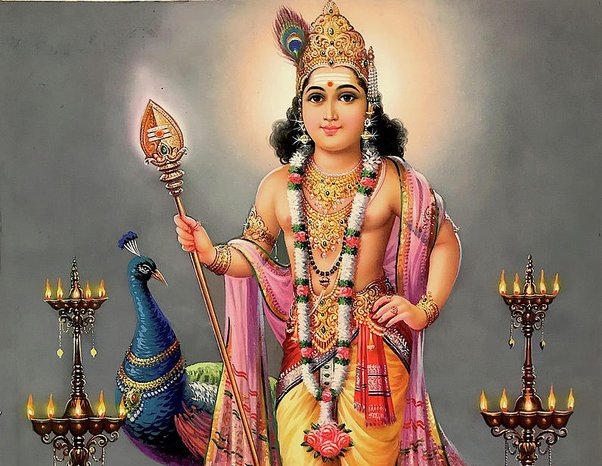No products in the cart.
Kartikeya Pragya Vivardhana Stotram
योगीश्वरो महासेनः कार्तिकेयोऽग्निनंदनः ।
स्कंदः कुमारः सेनानीः स्वामी शंकरसंभवः ॥१॥ẏogīśvaro ṃahā-Senah k͟hārtikeyo[a-āa]gni-ṇandanah |
Skandah k͟humārah Senānīh Svāmī ṣankara-Sambhavah ||1||
Meaning: Greetings to Sri Kartikeya the yogi expert, known as mahasena when he was called the son of agni deva known as kartikeya when he was called the son of six kritikas, known as skanda when he was called. son of devi Parvati, known as Kumara when he was named son of devi Ganga, leader of the devas army, who is our king and born to king Shankara.
गांगेयस्ताम्रचूडश्च ब्रह्मचारी शिखिध्वजः ।
तारकारिरुमापुत्रः क्रौंचारिश्च षडाननः ॥२॥ġāngeyas-ṭāmra-Cūddaśca Brahmacārī ṣikhi-ḍhvajah |
ṭāraka-ārir-ūmā-Putrah k͟hrauncā-ṟiśca Ssaddānanah ||2||
Meaning: Greetings to Sri Kartikeya who is loved by mother Ganga and her follower Tamrachuda, who celebrates and has a peg mark, who is the enemy of Tarakasura and Krauncasura, who is the son of devi Uma and has six faces.
शब्दब्रह्मसमुद्रश्च सिद्धः सारस्वतो गुहः ।
सनत्कुमारो भगवान् भोगमोक्षफलप्रदः ॥३॥ṣabdabrahmasamudraśca Siddhah Sārasvato ġuhah |
Sanatkumāro Bhagavān Bhogamokssaphalapradah ||3||
Meaning: Greetings to Sri Kartikeya who excelled in the knowledge of the sea of sabda-brahman, who is able to explain the great mysteries of the spirit of the sabda-brahman and that is why he is aptly known as guha when he is called the son of King Shiva (i.e., the image of the sabda-brahman). pure as sanatkumara, divine and which produces both the fruits of worldly pleasures (because of good deeds) and ultimate freedom.
शरजन्मा गणाधीश पूर्वजो मुक्तिमार्गकृत् ।
सर्वागमप्रणेता च वांच्छितार्थप्रदर्शनः ॥४॥ṣarajanmā ġannādhīśa Pūrvajo ṃuktimārgakrt |
Sarvāgamaprannetā Ca Vānccitārthapradarśanah ||4||
Meaning: Greetings to Sri Kartikeya who was born with a shara, a type of grass and that is why he is known as Saravana, whose elder is Sri Ganesha and who created (i.e. shown) the path of freedom, who is revered by all agamas (texts) and who points the way to the desired object of spiritual life (as stated in the scriptures).
अष्टाविंशतिनामानि मदीयानीति यः पठेत् ।
प्रत्यूषं श्रद्धया युक्तो मूको वाचस्पतिर्भवेत् ॥५॥āssttāvimśatināmāni ṃadīyānīti ẏah Patthet |
Pratyūssam ṣraddhayā ẏukto ṃūko Vācaspatirbhavet ||5||
Meaning: My devotees who repeat my twenty-eight words and think of my spiritual principles every morning in faith and devotion, will be a master of speech even if dumb (due to lack of wisdom).
महामंत्रमयानीति मम नामानुकीर्तनम् ।
महाप्रज्ञामवाप्नोति नात्र कार्या विचारणा ॥६॥ṃahāmantramayānīti ṃama ṇāmānukīrtanam |
ṃahāprajnyāmavāpnoti ṇātra k͟hāryā Vicārannā ||6||
Meaning: My spiritual values and the repetition of the devotion of my words will act as a maha mantra, and the devotee will gain great wisdom and wisdom by contemplating my divine leela (play).
इति श्रीरुद्रयामले प्रज्ञाविवर्धनाख्यं
श्रीमत्कार्तिकेयस्तोत्रं सम्पूर्णम् ॥७॥īti ṣrī-ṟudrayāmale Prajnyā-Vivardhan-āakhyam
ṣrīmat-k͟hārtikeya-Stotram Sampūrnnam ||7||
Meaning: It concludes with an explanation that adds wisdom and ingenuity from the text of the false rudra, thus concluding the magnificent Sri Kartike eulogy.
Description
These are the 28 words of Kartica and the one who repeats himself with devotion will be the king of speech, acquiring speech skills and sharpness, wisdom and knowledge of the king’s grace. Memory capacity will also increase.






